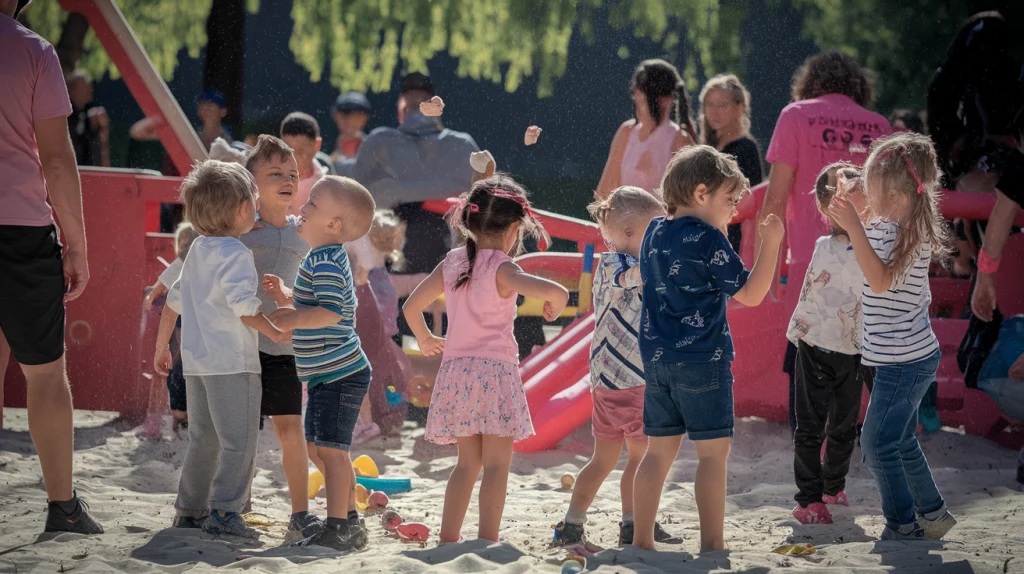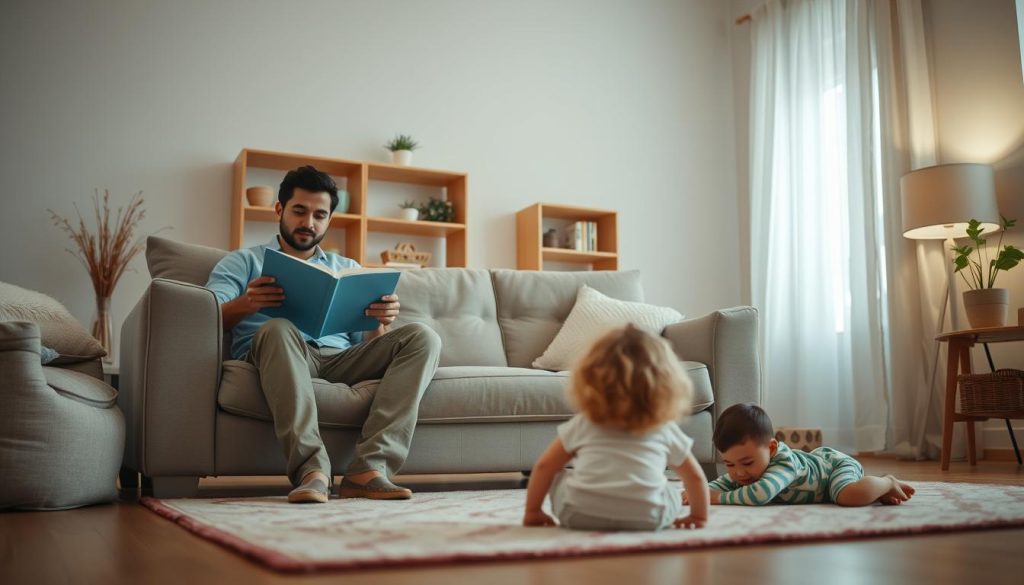
Did you know a study at the University of Virginia found kids who are rude now might grow up to be rude adults? It’s key to tackle disrespect in kids early on for their growth and future relationships. This guide shares 11 ways for parents to deal with kids who are rude, from mild eye-rolling to serious name-calling and physical aggression.
Ignoring disrespect in kids can make them rude adults later on. This guide will give you the tools to make your home a place of respect. It helps create a positive and harmonious family environment.
Key Takeaways
- Disrespectful behavior in children can lead to long-term issues if not addressed
- Effective strategies exist to manage and correct disrespectful behavior
- Building meaningful connections and setting clear boundaries are crucial
- Consistency and positive reinforcement are key in disciplining disrespectful kids
- Seeking professional support can be beneficial for families dealing with persistent disrespect
1. Understand why there are Disrespectful Kids: From Mild to Serious Behavior
Disrespectful behavior in kids can range from simple eye-rolling to serious actions like name-calling and hitting. Many parents feel upset when their kids act out, seeing it as disrespect. But, it’s key to remember that kids don’t always act like adults. They might not meet our expectations, especially when they’re young.
Signs of Mild Disrespect
Mild disrespect might look like ignoring instructions, eye-rolling, or using sarcasm. These actions can be tough for parents, but they’re common in certain ages.
Serious Disrespectful Behaviors
More serious disrespect can be ignoring rules, name-calling, and even hitting. Over 75% of kids with severe temper issues also have ADHD. Issues like learning or sensory problems can make kids feel frustrated and angry.
Long-term Impact of Unchecked Disrespect
Letting disrespect go unchecked can lead to rude behavior in adults. Blaming kids for their behavior can make them feel ashamed and stop them from learning. Shame can also block their brains from growing.
It’s vital to understand the range of disrespect in kids. By knowing the reasons and how to handle it, we can help our kids be more respectful.
“Encouraging parents to view children’s behavior through an age-appropriate lens can help maintain a calm and effective parenting approach.”
Staying calm and not reacting impulsively is key. It lets parents think clearly and guide their kids better. Getting positive feedback from others can also teach parents valuable lessons.
2. Know The Power of Selective Ignoring in Behavior Management
As parents, we face many challenges in managing our kids’ behavior. One useful method is selective ignoring. Selective ignoring means ignoring small acts of disrespect without getting into arguments.
Ignoring small disrespect, like shrugging or raised eyebrows, helps us stay focused. It prevents the situation from getting worse. We should warn our kids about the consequences of disrespect. Then, we talk about it calmly when we’re both feeling better.
It’s important to know when to ignore and when not to. Ignore small disrespect but not serious rudeness. This way, we avoid fights and work on a good relationship with our kids.
Selective ignoring works well with teenagers. Their brains are still growing and learning. By staying calm and consistent, we help them control their emotions and make better choices. This makes our family life better.

Using selective ignoring well means knowing when to ignore and when to act. Ignore small disrespect and deal with big issues clearly. This way, we manage our kids’ behavior and create a respectful home.
“Selective ignoring can be a powerful tool in a parent’s behavior management toolkit, allowing us to address disrespect while preserving the parent-child relationship.”
3. Build Meaningful Connections with Your Child
Creating strong bonds with our kids is key to solving disrespect and improving our relationship. Parenting help teaches us to look beyond the surface of their actions. By understanding what’s really going on, we can meet their true needs.
Identifying Root Causes
Disrespect might mean a child wants attention, help with feelings, or more freedom. It could also show a lack of trust or poor communication. As parenting 101 advises, seeing things from their point of view helps us find the real reasons.
Creating Quality Time
Spending quality time with your child strengthens your bond and tackles hidden issues. Experts say 12 hugs or physical touches a day can help. Also, having 15 minutes alone with your child daily helps with their feelings and well-being.
Establishing Trust and Communication
Trust and clear talk are vital for fixing disrespect. Parents should make time to talk about feelings and have fun together. This boosts good feelings and strengthens your bond.

“For every negative interaction in a relationship, there should be five positive interactions to maintain its health.”
By focusing on meaningful connections, parents can make their kids feel valued and supported. This reduces disrespect. Parenting help is more than discipline; it’s about growing a strong relationship and helping kids reach their best.
4. Use “When/Then” Statements Effectively
As a parent, dealing with kids’ disrespect can be tricky. Using “when/then” statements is a great way to handle this. These statements tell kids what happens if they act out, helping them change their ways and be more respectful.
A “when/then” statement is easy to make. It goes like this: “When you [do something good], then you get [something nice].” For instance, “When you speak softly, I’ll talk to you.” or “You can go outside after you clean up.” It teaches kids that being respectful gets them good things.
“When/then” statements are great because they don’t lead to fights. They focus on what kids should do instead of what they shouldn’t. This helps kids learn to make better choices and improves family life.
It’s important to use “when/then” statements the same way every time. This helps kids know what to expect and learn from their actions. It’s a way to teach them important skills like controlling impulses and managing feelings.
“When/Then” statements are a powerful tool in the parent’s arsenal, empowering children to make better choices and cultivate a culture of respect in the home.”
Adding “when/then” statements to your parenting can really help. It’s a simple yet effective way to teach kids to be respectful. This method can make your family’s life much better.
5. Teach Kids to Make Better Choices Through Practice
Positive discipline for kids who act disrespectfully is more than just punishment. It’s about teaching them to make better choices. By giving them chances to practice being respectful, we help them learn to communicate well.
Role-Playing Respectful Interactions
Role-playing is a great way to teach kids. Parents can show them how to speak and act respectfully. Then, kids can practice being respectful themselves. This way, they learn what respect means in real life.
Positive Reinforcement Techniques
Using positive reinforcement is also key in teaching respect. When kids speak or act respectfully, parents should praise them. This positive feedback helps them understand what’s expected and encourages them to be respectful again.
By offering practice and positive feedback, parents can help kids make better choices. This method not only fixes bad behavior but also helps kids grow in education and social skills.
“Practicing respectful behavior through role-playing and positive reinforcement empowers children to make better choices and communicate effectively.”
6. Set Clear Boundaries and Consequences
As parents, it’s key to set clear rules and consequences for our lazy disrespectful kids or rude disrespectful kids. Most bad behavior should get immediate punishment, based on the child’s age and how serious it is. For little kids, a calm-down spot works well. Older kids might lose some privileges. We aim to teach important skills and keep a good relationship with our kids while stopping bad behavior.
Choosing the right punishment is important. It should mean a lot to the child and fit their likes and dislikes. This could be taking away fun things or adding hard tasks, especially for tired of disrespectful kids who are always busy. Also, letting kids deal with the results of their actions helps them learn to take responsibility.
Finding the right punishment is key. It should be enough to fix the problem but not too harsh. We also need to keep good things in their lives while making sure they know the rules. This way, we teach them important lessons without just punishing them.
By setting clear rules and consequences, we teach our kids about respect, self-control, and being responsible. This method not only fixes the bad behavior now but also helps them grow up well and have good relationships later.
| Consequence | Effectiveness | Appropriate Age |
|---|---|---|
| Calm-down corner | Effective for addressing mild disrespect | Younger children |
| Loss of privileges | Effective for addressing more serious disrespect | Older children and teenagers |
| Natural consequences | Encourages responsibility and self-reflection | All ages |
| Emotionally significant consequences | Tailored to the individual’s interests and desires | All ages |
“The most effective consequences are those that are emotionally significant and tailored to the individual’s interests and desires.”
7. Highlight The Role of Restitution in Correcting Disrespectful Behavior
Restitution is key in fixing ungrateful and disrespectful kids. It means the child does something nice for the person they hurt or fixes any damage. This way, they learn how their actions affect others.
Making Amends
Saying “I’m sorry” isn’t enough when a child is disrespectful or hurts someone. They must do something real to fix it, like apologizing in person or doing a task for the hurt person. This teaches them that their actions have real effects and they must own up to their mistakes.
Learning from Mistakes
Through restitution, kids can think about their actions and learn from them. This method helps them grow empathy, solve problems, and feel more responsible. It also helps avoid future disrespect and builds better family ties.
Restitution is a strong tool for parents dealing with ungrateful and disrespectful kids. By making kids accountable and help them make amends, we guide them to be more respectful and caring. This strengthens family bonds.
“Restitution is an essential part of the healing process, as it allows the child to take responsibility for their actions and actively work to repair the harm they’ve caused.” – Dr. Emily Fulton, Child Psychologist
8. Balance Authority and Independence for Teenagers
When dealing with teenagers, it’s key to find the right balance between authority and independence. Disrespect often comes from their growing need for freedom, mood swings, and changing views. It’s normal and usually short-lived. Parents should stay calm, use humor, and be good role models.
It’s vital to have clear rules but also let teens show their independence in good ways. This balance helps them grow.
Some teens act out by being rude, rebellious, or ignoring rules. They’re trying to find who they are during these years. Problems with communication and emotional issues like sadness or anger can also lead to disrespect.
Talking openly and without judgment is key to solving these issues. Setting clear rules is also important for parents. If mental health or drug problems arise, seeking help is crucial. Teens learn by watching, so showing respect can help them too.
Smart parenting means finding the right balance with teenagers. Understanding why they act out and using good communication can help them grow into responsible adults.
“The teenage years are a time of growth, self-discovery, and testing boundaries. As parents, our role is to provide a supportive and nurturing environment that fosters their independence while also maintaining clear guidelines and rules.”
9. Avoid Taking Disrespect Personally
As parents, it’s key to know that kids’ disrespect is usually not aimed at us. It shows their age and feelings. We might fear standing up to disrespect could make things worse, especially if our kids have cut us off before. But, disrespect is a normal phase many kids go through. With the right help, they can learn to speak respectfully.
Understanding Developmental Stages
Teen brains are still growing, which can make it hard for them to understand others and control their feelings. A 7-year-old might mock or get angry when told what to do. Knowing this can help us be more patient and understanding.
Managing Parental Emotions
It’s easy to feel hurt when kids are disrespectful, but we must control our feelings. We often feel deeply responsible for our kids, even as adults, which can make us feel guilty. Staying calm and not getting defensive helps us handle the situation better and shows our kids how to be respectful. Using good communication skills, like being clear and listening well, is key when dealing with disrespect.
Disrespect often means kids are stressed or worried. Being kind and understanding can really help. By not taking disrespect personally and focusing on our kids’ needs, we can strengthen our relationship with them.
10. Create a Culture of Respect in Your Home
Creating a respectful home is key for a happy family. Respect means different things in different places. It’s about how we see and treat each other.
Parents should show respect to teach kids how to be respectful. Respect grows over time, through sharing and caring for each other. But, asking for respect when it’s hard can be tough for kids to understand.
- Make clear rules about being respectful. Talk to your kids about why respect is important.
- When kids are respectful, praise them. This helps build a respectful home.
- Deal with disrespect quickly. Use consequences to teach respect.
By teaching respect at home, you help your kids value respect in all their relationships. Respect grows as relationships get stronger.
“Respect is not something you demand, it’s something you earn through your actions and the way you treat others.”
| Respect Building Strategies | Benefits |
|---|---|
| Modeling respectful behavior | Fosters mutual respect and admiration in parent-child relationships |
| Involving children in rule-setting | Helps them understand the importance of respect in all relationships |
| Focusing on positive behavior | Reinforces the desired culture of respect in the home |
| Addressing disrespect promptly and consistently | Teaches children the value of respect through appropriate consequences and restorative practices |
Teaching respect at home helps kids deal with conflicts and challenges. It teaches them to be empathetic and understanding. Many adult children face problems after moving out, like bad choices and disrespect.
It’s common for parents to struggle with adult children who disrespect them. These kids might face hard times and come back for help.
By teaching respect, you prepare your kids for life’s challenges. They’ll be humble and grateful for their parents’ wisdom.
11. Practice Consistency in Discipline
Consistency is key when disciplining kids. Parents need to have clear rules and consequences. They should apply these rules consistently. Kids do better when they know what’s expected of them.
It’s normal for kids to make progress and then slip back. So, parents must be patient and keep trying. The Repeat Re-do method is a good strategy. It lets kids fix their behavior right away.
With time, kids learn to behave correctly the first time. This method helps them grow into respectful kids. It teaches them to solve problems in a respectful way, reducing the need for harsh discipline.
Being consistent in discipline is an investment in a child’s future. It shapes their character and teaches them valuable lessons. By praising good behavior and seeing mistakes as learning chances, parents can help kids become more respectful.
Consistency is the bedrock of effective disciplining when it comes to dealing with disrespectful kids.
“The strategy is highlighted as a foundational tool for parents to instill values and behaviors that will benefit children as they grow into adulthood, focusing on long-term character development.”
Disciplining a disrespectful child can be tough. But, being consistent is crucial for lasting change. With patience, persistence, and positive reinforcement, parents can help their kids develop respect and self-discipline.
Dealing with disrespectful behavior in kids is complex. Clear expectations, open communication, and strategies like Repeat Re-do are essential. Consistent discipline, based on empathy and understanding, is the best way to teach kids essential life skills.
Conclusion
Dealing with disrespectful kids needs a mix of understanding, clear talk, and steady discipline. Parents should build strong bonds, set clear rules, and act respectfully themselves. This helps kids learn to be positive and healthy in their relationships.
It’s important to know that disrespect can come from growing up or hidden issues. Parents should tackle these problems, not blame themselves. Using methods like ignoring certain behaviors, making “when/then” statements, and praising good actions helps kids make better choices and own up to their mistakes.
The main goal is to make a home where respect is key. Kids should learn to obey, be kind, and respect others early on. By sticking to these parenting 101 tips and being patient, parents can help their kids grow into respectful, self-aware people. This is true even when facing tough times.
Source Links
- https://www.parents.com/disrespectful-children-8609412
- https://www.melpeirce.com/blog/disrepectfulkids
- https://childmind.org/article/disruptive-behavior-why-its-often-misdiagnosed/
- https://www.daniel-wong.com/2018/03/19/disrespectful-teenager/
- https://www.peacefulparenthappykids.com/read/10-habits-to-stay-connected-to-your-child
- https://www.parents.com/common-child-behavior-problems-and-their-solutions-1094944
- https://heidisongs.blog/consequences-that-teach-better-behavior-instead-of-punish/
- https://www.kiddiematters.com/behavior-management-strategies-disrespectful-students-work/
- https://www.boundariesbooks.com/blogs/boundaries-blog/how-to-determine-the-right-consequences-when-setting-boundaries
- https://iepmommy.com/19-things-kids-do-that-show-disrespect-and-should-never-be-overlooked/
- https://childmind.org/article/teaching-kids-boundaries-empathy/
- https://www.parents.com/discipline-strategies-for-teens-1094840
- https://ccsam.net/wp-content/uploads/2024/06/School-Wide-Behavior-Discipline-Plan-Parent-Student-Version-2024-25-0240621.pdf
- https://www.liahonaacademy.com/authority-issues-how-to-address-problems-with-teens-and-authority-figures.html
- https://www.psychologytoday.com/intl/blog/liking-the-child-you-love/202406/3-reasons-youre-allowing-your-adult-child-to-disrespect-you
- https://www.janetlansbury.com/2024/10/is-disrespect-a-tantrum-in-disguise/
- https://www.firstsession.com/resources/how-to-deal-with-disrespectful-family-members
- https://thepeacefulparent.com/2023/12/27/stop-using-respect-weapon/
- https://hirnhomeschoolers.com/parenting-an-adult-child-that-is-disrespectful-and-disobedient/
- https://godlyparent.com/behavior-strategy-1-the-repeat-re-do/
- https://www.janetlansbury.com/2023/11/our-strong-willed-child-is-running-the-show/
- https://www.sedonasky.org/blog/disrespectful-rude-behaviors-in-the-classroom
- https://melindawmoyer.substack.com/p/what-to-do-when-your-kid-is-rude
- http://thrivingkidsconnection.com/ending-a-discipline-time-with-the-positive-conclusion/




